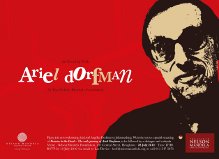
July 30, 2010 –The Nelson Mandela Foundation hosted an evening with Ariel Dorfman on Wednesday night and invited select donors, stakeholders and staff to enjoy a screening of A Promise to the Dead: The Exile Journey of Ariel Dorfman.
Ariel Dorfman, the acclaimed Chilean-American author and human rights activist, is in South Africa to deliver the Eighth Nelson Mandela Annual Lecture on Saturday, July 31.
Dorfman has spent the last week in South Africa, participating in a number of events around the country which focus on reaching out to students, writers and the public at large and discussing issues of reconciliation, justice and the role of art in democracy.
The evening started with a screening of A Promise to the Dead: The Exile Journey of Ariel Dorfman.f The documentary follows Dorfman’s return to Santiago after 18 years in exile, telling the story of the man who has dedicated his life to chronicling the injustices of General Augusto Pinochet’s military rule and to giving a voice to the thousands of people who disappeared during that time.
Dorfman said: “This is not a perfect life or a perfect film, but we did our best to tell our story – and I think that it resonates with you here in South Africa.”
Following the screening, guests were invited to ask questions.
A member of the audience asked: “It is easy to mobilise people to break things down but not so easy to build something. How do we mobilise people around a common narrative and vision?”
Dorfman replied: “I don’t have the answer. If I did I would be the world president. How [this] narrative is articulated is the major political task of our time. The idea of articulation is so important for writers and artists, and we need to bring more artists in and create ways of writing [these] stories.”
Graça Machel, international advocate for women’s and children’s rights, said: “Thank you for telling this story. It is based in fact [but you have] such a human way of telling and such a beautiful ability to communicate this.”
Manti Grobler, SAP’s CRM solution manager, said: “What really impressed me was the need to tell the story – the parallels, the similarities between so many different struggles and how we learn from history. Remembering these people is the least that we can do.”
Florence Garishe, receptionist at the Nelson Mandela Foundation, said: “The documentary was wonderful. The experience they had! Really, what happened there is what happened to us. It is important to understand. History is so important and I’m worried that our children don’t understand.”
Prior to the screening, Dorfman took a tour of the Foundation’s Centre of Memory and Dialogue.
On the tour he visited the Foundation’s processing room where all archive items are received and then processed prior to being moved to storage. Dorfman spent some time perusing the Foundation’s printed publications, including: Hunger for Freedom: The Story of Food in the Life of Nelson Mandela and A Prisoner in the Garden.
While paging through Nelson Mandela: The Authorised Comic, he said: “This is terrific, I love this. Of course I know it all, but it’s different like this [in comic format].”
He then went on to view some of Mr Mandela’s personal archives and saw some of the meticulous records that Mr Mandela has kept during his life.
He looked at the oldest photo of Mr Mandela, and another he kept in his Robben Island prison cell, as well as his church membership cards and 1964 warrant of committal.
While viewing a book in which Mr Mandela kept a copy of all of the letters he wrote while in prison, Dorfman said: “From the very beginning, the idea of memory was very important – the importance of keeping a record. He was very meticulous.”